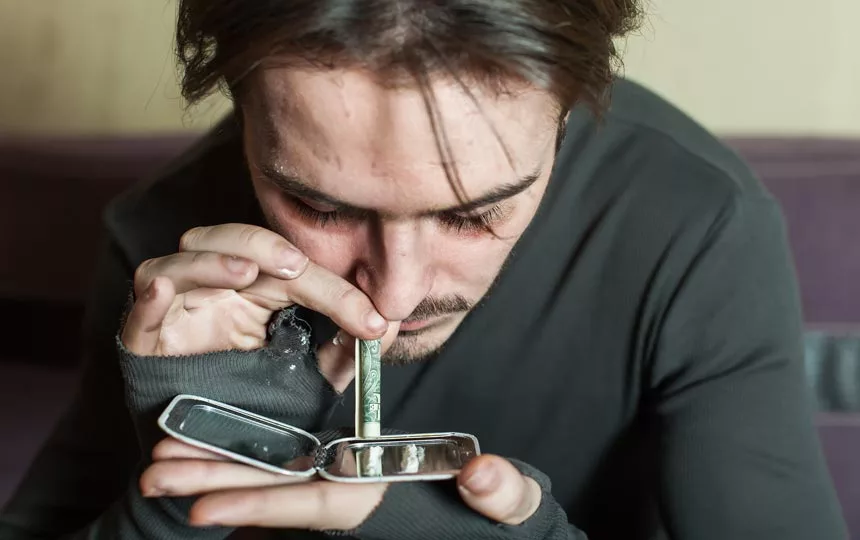A Timeline for Cocaine Withdrawal
Table of Contents
According to the National Institute on Drug Abuse (NIDA), nearly 15% of American adults have used cocaine at least once during their lifetime. Unfortunately, in many cases, one time is all it takes to get addicted to this toxic drug.
For those who don’t experience immediate addiction, a physical dependence can occur over time with regular abuse of this deadly substance. Finding out about the cocaine withdrawal timeline can help you break your coke habit once and for all, and that’s exactly why we’ve written this complete guide on the topic!
Cocaine is a highly addictive stimulant derived from the coca plant native to South America, which provides users with a feeling of euphoria by tricking the brain into producing excessive levels of dopamine and norepinephrine (adrenaline). Over time and with consistent substance abuse, the body grows accustomed to these effects and begins to crave them more and more.
This is what causes people to develop stimulant use disorders. Once this happens, when that drug use stops, the body crashes, and individuals experiencing cocaine withdrawal will have a rapid decrease in mood, energy, and overall well-being. As withdrawal sets in, symptoms only grow worse.
Without immediate treatment, this powerful stimulant can cause a plethora of long-term psychological effects and physical deficiencies. And with too many years of heavy abuse, it can even result in death from all the undue stress on the body, brain, and most importantly, the heart. However, with the right intervention measure, recovery from cocaine addiction is possible — but it’s not all that simple.
Unfortunately, the road to recovery is one that requires great strength and perseverance, as some (but not all) of the hardest steps lie in the early stages of detox. Are you a heavy cocaine abuser? Are you tired of letting your addiction take over your life? It’s time to take the difficult but necessary effort for recovery.
This critical journey is certainly not easy, and it’s important to be fully aware of what lies ahead of you in order to be fully prepared. Keep reading and get resources for a new approach to life now!
What are the Factors that Can Affect Cocaine Detox?
Cocaine is known to have an exceedingly short half-life, which enables withdrawal symptoms to start as early as 90 minutes after the last dose and last anywhere from 7 to 10 days or more. However, in extreme cases, a person’s withdrawal symptoms can persist for weeks. Like many other illicit drugs, it’s also important to note that cocaine causes intense cravings that can last for extended periods of time.
Even after withdrawal and years of sobriety, these cravings can redevelop suddenly. Every person that struggles with a cocaine addiction experiences withdrawal differently, as timelines vary. For some, acute withdrawal symptoms from cocaine can last as long as three weeks and as little as one week.
After one’s last use of cocaine, its toxins can remain in the blood, saliva, and urine for at least 72 hours. For heavy cocaine users, this drug can remain in the system for as long as two weeks. Factors like metabolism, weight, dosage, and frequency of use can sway how long cocaine stays in the body.
Just like there are factors that determine how long cocaine can stay in someone’s system, there are also factors that influence one’s withdrawal timeline and severity of symptoms. Here are a few examples of factors that can affect and influence one’s timeline for cocaine withdrawal:
Length of Use
One’s history of cocaine use is a large determining factor of how long and severe their withdrawal period from the toxic substance will be. This is especially true for one’s length of use. Individuals who have abused cocaine for years are likely to experience intense withdrawal with symptoms that can linger for weeks. This is because they have a significant buildup of cocaine in their system (from long-term use) that needs to be metabolized and expelled.
Amount of Use (Quantity)
The amount of cocaine use or the dosage size can also determine the intensity of one’s detox from cocaine. People who abuse heavy doses of cocaine — even if it’s for a short period of time — are just as likely to have a difficult withdrawal process as a long-term user. Consuming large quantities of cocaine in small periods of time enables the brain to experience a strong and continual high and, without it, the body and brain will struggle.
Additionally, the purity of the cocaine can also affect how much a person uses, as it’s not uncommon for dealers to cut their product with other powders — reducing its purity. Those who have been using a purer form of cocaine will have a harder time detoxing.
Environment
One’s environment has everything to do with addiction problems, the ability to detox, and future success in sobriety. If an individual is living in an environment where drug use is common and encouraged, finding the will and opportunity to detox can be exceedingly difficult. Additionally, if cocaine was used as a form of stress relief from a difficult environment (i.e., work, relationship, family problems), those triggers can delay and make the withdrawal process even harder.
Co-Occurring Health Problems
Mental health issues like depression or anxiety can complicate the withdrawal process. The same goes for physical health problems like heart disease and high blood pressure. Professional assistance is always recommended for those going through withdrawal, but it is especially necessary for those who are experiencing co-occurring health problems.
Dependence on Multiple Substances
Potential complications in the withdrawal process can arise if an individual is addicted to more than one substance — also referred to as polysubstance dependence. As stated before, with these circumstances, detoxing in a professional facility is essential.
If you or someone you know is addicted to cocaine and ready to take the next steps toward recovery, it’s advised to speak to your doctor or primary care physician first. These medical professionals will be able to provide you with addiction treatment resources like inpatient facilities that provide top-of-the-line detox treatment.
The staff at these programs are highly trained to handle and treat the precarious nature of withdrawal and detox — keeping you or your loved one safe throughout the entire process. Detoxification and withdrawal that are not treated can be potentially life-threatening, which brings us to our next point.
Why Going “Cold Turkey” Is Not the Answer
Quitting highly addictive substances like cocaine “cold turkey” can be an easy recipe for disaster, as it carries numerous health risks. Far too often, people struggling with addiction believe that abruptly stopping their drug use is the right start to detox. This option always seems appealing because they believe it’s easier to avoid the drug entirely than moderate their usage or seek professional help.
Unfortunately, this method can be very dangerous and sometimes fatal in those who have a severe addiction or untreated underlying health conditions. For example, some individuals have experienced seizures and heart problems due to stimulant withdrawal after going cold turkey.
Attending a professional and reputable cocaine detox program provides these individuals with complete access to the right resources and medical support needed to ride out the worst of the withdrawal process. If severe symptoms do present themselves during detox, medical professionals will be there to properly treat and monitor the situation — ensuring the safety of their patients. Before going “cold turkey,” please consider other available options to assist you on your journey to sobriety.
Cocaine Withdrawal Symptoms and the Cocaine Withdrawal Timeline
As stated earlier, the withdrawal timeline for quitting cocaine can vary from patient to patient due to a variety of previously-mentioned factors like frequency of use, dosage, environment, and existing health problems — to name a few. While it’s difficult to precisely determine the length of time cocaine withdrawal will last for as well as the intensity of symptoms, we’ve compiled a general timeline below.
After the last ingestion of cocaine, individuals can expect to experience the following:
24-72 Hours
The first 24 to 72 hours after ceasing cocaine is not as seemingly strenuous as many think. During this stage of the cocaine withdrawal timeline, there are still trace amounts of the drug in one’s system, which will alleviate some of the milder symptoms that tend to present themselves at this acute stage of withdrawal. For some, these symptoms may take hours to set in, but there are circumstances where individuals can experience symptoms within 90 minutes of their last hit.
When symptoms do set in, and cocaine leaves the system, the “crash” phase begins. The feeling of euphoria vanishes, and the body crashes. Patients begin to experience more physical symptoms, such as a decrease in mood and energy as other milder symptoms like nausea and vomiting set in.
Some individuals may even experience psychological withdrawal symptoms, including slight depression and anxiety, poor concentration, and irregular sleep patterns. Importantly, cravings for cocaine will be on overdrive.
4-7 Days
After the initial crash phase, the cocaine should be cleared from the system. In some cases, patients will experience a variety of physical and psychological effects as the withdrawal persists. Many have reported feeling intense depression and anxiety, as well as complete dysphoria — a lack of interest in life and activities.
By now, cravings will begin to decrease, but some people report some mild forms of cravings. However, it’s important to keep an eye out for symptoms like seizures, heart attack, and irregular heart rate, as these tend to be common and life-threatening in long-term users. Fortunately, with the help of a licensed medical professional, these symptoms can be monitored and managed.
Weeks 1-3
After the first week or two of withdrawal, some patients finally start to feel some relief in symptoms and cravings. Some people have noted that they started to physically feel better and had an increased appetite. However, a few unpleasant side effects from cocaine detox are still present. Irritability, anxiety, and depression are still pretty common. Some patients even have strong mood swings — experiencing strong anger, overwhelming sadness, and even suicidal thoughts. It’s also not common to have vivid dreams or night terrors at this point in the detox process.
Week 3 and Beyond: The Post Acute Cocaine Withdrawal Timeline
After three weeks, the majority of the largest obstacles have passed, and the body is beginning to adjust and function without the need for cocaine. Cravings should also start to subside. This is typically referred to as the extinction or final stage of withdrawal and varies from person to person. Although the worst of the withdrawal phase is in the past, individuals are still at risk for relapse if they are exposed to triggers or return to an unsafe and unhealthy environment. Recovery is a continuous process, and it’s important that they remember that.
Relapse isn’t the only thing that those in detox are at risk of; many of those who were heavy abusers of cocaine are also at risk of developing protracted withdrawal or Post-Acute Withdrawal Syndrome (PAWS). PAWS is an irregular and ongoing cluster of detox symptoms that can present after the passing of standard withdrawal, also known as acute withdrawal. These symptoms tend to be more psychological and mood-related and can be as equally as intense as the initial withdrawal. Symptoms include:
- Paranoia
- Twitching and tremors
- Aggression
- Fatigue
- Physical weakness
- Extreme depression
Episodes of PAWS can come and go and usually last for a few days at a time. However, its cyclical nature can persist for an extended period, putting individuals at an increased risk of relapse. This makes the presence of aftercare planning and a solid sober support network all that much more important for those recovering from cocaine dependence.
Next Steps and Seeking Help for Cocaine Use
Even after the medical cocaine detox process is complete, there is still a long road (to recovery) ahead. For those who have withdrawn from cocaine and properly detoxed, it’s advised that they enroll in an addiction treatment program and work the remaining steps to sobriety.
Detoxing from cocaine can be an intense and difficult process, but it’s a process that will open the doors to a completely new life — one that is happy, healthy, successful, and most importantly, free from substance use.
With its precarious and inconsistent nature, cocaine withdrawal is extremely challenging and not recommended to commence on your own. Specialized help should be sought out, and a strong support system should be established. The Substance Abuse and Mental Health Services Administration (SAMHSA) recommends that those seeking cocaine addiction treatment participate in highly individualized and comprehensive recovery programs.
Help with Cocaine Addiction: Found Here
If you or someone you love is struggling with cocaine addiction and are ready to begin the recovery process, give Find Addiction Rehabs a call. Our professionals are available 24/7 to guide you toward recovery and provide you with the best rehab and detox center that meets your specific needs.
We’re here to help you or your loved one find the path to sobriety and come up with a comprehensive treatment plan to help you overcome your substance use disorder in the safest and most comfortable way possible.
Give yourself a break and contact us today to discuss your treatment options, confidentially, with the help of our dedicated recovery representatives!
Deborah Tayloe is a freelance writer specializing in health and sciences. Deborah earned a B.S.Ed. in Secondary Education/English, accompanied by a Spanish minor. Her writing expertise allows her to craft engaging, impactful articles to help people be well.
In addition, she holds a fully accredited Certificate of Natural Medicine and is a certified Herbalist. Through her understanding of complementary medicine, Deborah helps medical professionals give people the information they need to embrace natural approaches to wellness.
When she’s not working, Deborah trains for 5K races and advocates for animal rights.





